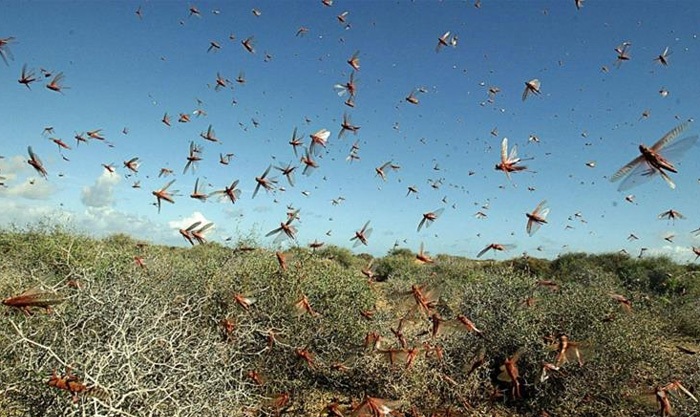Regional experts are sounding the alarm as concerns grow over the potential resurgence of locust swarms early next year. With the devastating impact witnessed during previous outbreaks, authorities and communities are urged to remain vigilant and take proactive measures to mitigate the impending threat.
The warning comes from a group of esteemed experts who have been closely monitoring the situation.
According to the latest assessments by Inter -Government Authority on Development regional experts say , there is a looming danger of locust swarms making a comeback in early 2024.
These experts, who have been at the forefront of studying locust behavior and patterns, have observed certain indicators that suggest a high likelihood of a resurgence.
During their research, experts have identified several contributing factors that could facilitate the return of locust swarms. These factors include favorable weather conditions, such as increased rainfall and warmer temperatures, which provide optimal breeding grounds for locusts.
Additionally, the availability of vegetation and crops, coupled with the locusts’ ability to reproduce rapidly, further exacerbates the risk of a large-scale infestation.
The previous outbreaks of locust swarms have left a trail of destruction across the region, severely impacting food security and livelihoods.
Given the potential magnitude of the forthcoming threat, regional authorities are urged to take swift action to prevent a similar catastrophe.
This includes enhancing early warning systems, strengthening surveillance and monitoring mechanisms, and implementing targeted interventions to curb the spread of locusts.
Furthermore, community participation and awareness are crucial in combatting the locust menace. Local communities should be educated about preventive measures and encouraged to report any sightings of locusts promptly.
By fostering a collaborative approach, authorities can effectively respond to and manage locust outbreaks, minimizing the damage caused to agriculture and the environment.
The regional experts emphasize that coordinated efforts and proactive measures are paramount in addressing the imminent return of locusts.
International collaboration and support are also crucial in providing the necessary resources, expertise, and funding to combat the potential crisis. By working together, countries can strengthen their collective resilience and enhance their preparedness to tackle the challenges posed by locust infestations.
As regional experts issue a warning about the anticipated return of locust swarms in early 2024, it is imperative for authorities, communities, and international partners to prioritize preventive actions.
By implementing robust early warning systems, promoting awareness, and implementing targeted interventions, the region can effectively mitigate the impact of locust outbreaks.
With collective efforts and a proactive approach, the region can safeguard food security and protect livelihoods from the devastating consequences of locust infestations.


